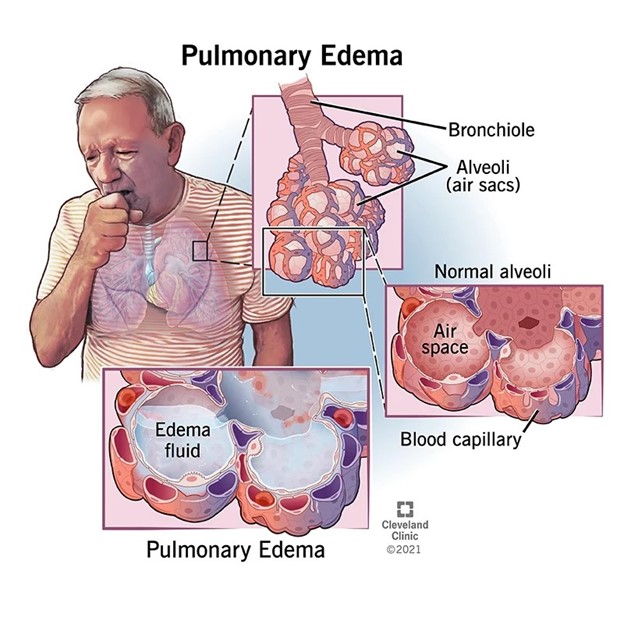A nurse is collecting data for a client who is receiving enteral tube feedings. The nurse should identify that which of the following findings is a manifestation of fluid overload?
Weight loss
Decreased blood pressure
Crackles heard in the lungs
Decreased skin turgor
The Correct Answer is C
Fluid overload refers to an excess volume of fluid in the body, which can occur as a result of various factors, including excessive fluid intake or inadequate fluid removal. Crackles heard in the lungs, also known as rales, can indicate fluid accumulation in the lungs, a condition known as pulmonary edema. It is a common manifestation of fluid overload and can be detected through auscultation of the lungs.

Weight loss is typically associated with inadequate calorie or nutrient intake, rather than fluid overload.
Weight loss is typically associated with inadequate calorie or nutrient intake, rather than fluid overload.
Weight loss is typically associated with inadequate calorie or nutrient intake, rather than fluid overload.
Nursing Test Bank
Naxlex Comprehensive Predictor Exams
Related Questions
Correct Answer is A
Explanation
Avoid quoting client comments when documenting: This is the correct action to take. When documenting client care, it is important to use objective language and avoid directly quoting client comments. Instead, the nurse should summarize or paraphrase the client's statements using professional and objective language.
Incorrect:
B- Limit documentation to subjective information: This is an incorrect action to take.
Documentation should include both subjective and objective information. Subjective information refers to the client's own experiences, perceptions, and feelings, while objective information refers to measurable and observable data.
C- Document giving a dose of pain medication just prior to administration: This is an incorrect action to take. Documentation should accurately reflect the timing and administration of medications. Documenting giving a dose of pain medication just prior to administration would be inaccurate and could lead to confusion and potential medication errors.
D- Document information telephoned in by a nurse who left the unit for the day: This is an incorrect action to take. Documentation should only include information that the nurse personally witnesses, assesses, or performs. Information provided by another nurse should be documented as a report or handoff communication rather than direct documentation.
Correct Answer is B
Explanation
The nurse should describe hyperactive bowel sounds as sounds that are loud, high-pitched, and increased in frequency and intensity. They are more frequent than the normal bowel sounds, with a rapid succession of sounds occurring at a rate greater than 5 to 30 sounds per minute.
Hyperactive bowel sounds can be heard in conditions such as gastroenteritis, diarrhea, and early mechanical bowel obstruction. They indicate increased bowel motility and are often associated with increased peristalsis.
To differentiate hyperactive bowel sounds from normal or hypoactive bowel sounds, the nurse can explain that hypoactive bowel sounds are decreased or absent sounds that occur when the bowel motility is decreased, such as in conditions like paralytic ileus or after abdominal surgery. Normal bowel sounds are typically soft, low-pitched, and occur at a rate of 5 to 30 sounds per minute.
Whether you are a student looking to ace your exams or a practicing nurse seeking to enhance your expertise , our nursing education contents will empower you with the confidence and competence to make a difference in the lives of patients and become a respected leader in the healthcare field.
Visit Naxlex, invest in your future and unlock endless possibilities with our unparalleled nursing education contents today
Report Wrong Answer on the Current Question
Do you disagree with the answer? If yes, what is your expected answer? Explain.
Kindly be descriptive with the issue you are facing.
